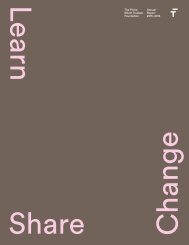Change
petf2016_english
petf2016_english
Create successful ePaper yourself
Turn your PDF publications into a flip-book with our unique Google optimized e-Paper software.
6 THE PIERRE ELLIOTT TRUDEAU FOUNDATION ANNUAL REPORT 2015–2016 7<br />
About us<br />
Our<br />
Themes<br />
Human rights and dignity<br />
Among other questions, research would explore emerging fault<br />
lines, the link between human rights, inclusion, economic equality<br />
and political participation, evolving legal and cultural dimensions<br />
of human rights and dignity. Possible lines of inquiry include<br />
violence, poverty, health, education and nurture, employment,<br />
intergenerational inequities as well as failures of recognition, failures<br />
to act and failed actions.<br />
· Living conditions and<br />
prospects of children born<br />
of wartime rape in Africa’s<br />
Great Lakes region: 2014<br />
fellow Myriam Denov<br />
· The rights and conditions<br />
of transgender people<br />
inside and outside prisons<br />
in Canada and Brazil: 2015<br />
scholar William Hébert<br />
· End-of-life law and policy:<br />
2015 fellow Jocelyn Downie<br />
· The adverse effects of<br />
child removal by the state<br />
for mothers who use drugs<br />
in Canada: 2015 scholar<br />
Meaghan Thumath<br />
The Foundation grounds its activities in four major themes<br />
central to the life and work of Pierre Elliott Trudeau:<br />
human rights and dignity, responsible citizenship, Canada<br />
in the world, and people and their natural environment.<br />
These themes are interconnected and encompass issues<br />
of critical importance to people in Canada and abroad.<br />
The Foundation community is committed to exploring these<br />
themes through our Learn, Share, <strong>Change</strong> approach.<br />
Responsible citizenship<br />
Research on this theme might focus on political values and the<br />
exercise of democracy, taking growing social diversity into<br />
account. It would also be of interest to examine, from a historical<br />
and comparative perspective, the institutional conditions for civic<br />
involvement and corporate “good citizenship” practices. Research<br />
might also centre on the notion of citizenship and how, in modern<br />
societies, citizenship is being redefined in a growing number and<br />
variety of political arenas.<br />
Canada in the world<br />
Research in this area might focus on strategies for addressing<br />
challenges to global peace and security, global public health, the<br />
environment and food security. It could focus on how international<br />
law and global institutions should evolve to reflect the shift in global<br />
power to emerging state and non-state actors. It is also concerned<br />
with how to promote and protect Canada’s interests and values,<br />
including pluralism and diversity.<br />
· How empathy among<br />
youth affects young people’s<br />
concept of responsible<br />
citizenship: 2015 scholar<br />
Rebeccah Nelems<br />
· Security issues in the wake<br />
of the war on terrorism: 2013<br />
fellow Kent Roach<br />
· Canada’s role in assessing<br />
and addressing the domestic<br />
and international impact of<br />
mining activities on agriculture<br />
and food security: 2015<br />
scholar Samara Brock<br />
· How the evolution of<br />
international law might allow<br />
Canada to respond to climate<br />
change in innovative ways:<br />
2016 scholar Christophe<br />
Campbell-Duruflé<br />
· The relationship between<br />
disability and citizenship<br />
in nineteenth- and early<br />
twentieth-century United<br />
States: 2015 scholar<br />
Caroline Lieffers<br />
· How Arab youth experience<br />
citizenship in Canada: 2015<br />
fellow Bessma Momani<br />
· The use of science in global<br />
health policymaking by<br />
Canadian institutions: 2015<br />
scholar Ben Verboom<br />
· Strategic changes in the<br />
Indo-Pacific and what they<br />
mean for Canada: 2015<br />
fellow Cleo Paskal<br />
People and their natural environment<br />
Research on this theme may focus on environmental security at<br />
the global level and on approaches for reducing the vulnerability of<br />
ecosystems. It may examine issues of environmental justice. The link<br />
between healthy ecosystems, communities and individuals would<br />
benefit from more robust research. Other issues include climate<br />
change, access to sustainable resources, green technologies, and<br />
sustainable transportation strategies.<br />
· How we can design<br />
institutions to manage<br />
rapidly changing natural<br />
environments: 2015 scholar<br />
Tahnee Prior<br />
· Documenting the wealth<br />
of Indigenous knowledge,<br />
practices, and beliefs around<br />
plants and the environment:<br />
2015 fellow Nancy Turner<br />
· Ways to cultivate public<br />
conversations around<br />
climate change and environmental<br />
justice: 2016 fellow<br />
Catriona Sandilands<br />
· Strategies for decreasing<br />
Canada’s domestic carbon<br />
emissions while continuing<br />
fossil fuel extraction: 2014<br />
scholar Nathan Lemphers<br />
“For my cohort of scholars, it seems that<br />
our research projects continuously straddle<br />
the boundaries between the four themes<br />
of the Foundation and intersect with one<br />
another. We are fortunate to benefit from<br />
such an environment, which allows us to put<br />
our respective disciplines in dialogue with<br />
one another to better address the pressing<br />
social issues that matter to us.”<br />
Christopher Campbell-Duruflé, 2016 scholar<br />
“The Foundation’s focus on these important<br />
themes, but more importantly on their<br />
intersection is a strong testament to its<br />
commitment to fostering leading scholarship<br />
for a rapidly changing world.”<br />
Cynthia Morinville, 2016 scholar<br />
“The Foundation’s four themes cover issues<br />
that can’t be done justice to without calling<br />
on different disciplines and the views of<br />
different stakeholders. This interdisciplinarity<br />
is what makes the Foundation such a rich,<br />
creative environment for innovation on<br />
traditional research.”<br />
Antoine Pellerin, 2016 scholar



